Spanishuptile | Nº 1 Best Porcelain and wall tiles for your home
PAVEMENTS AND TILES FOR TERRACE GARDENS
¡Spanishuptile, where tiles come to life!
TERRACES, BACKYARDS, GARDEN INOUT TILES
Best Sellers
ENJOY DOWNLOADING OUR MADE IN SPAIN TILES CATALOGUES
PRISSMACER
PRISSMACER
Looking for the perfect outdoor flooring for your next project? Our Spanish outdoor tiles and paving are the perfect choice. With a wide variety of styles, shapes, colors, and textures, our outdoor tiles can be adapted to any environment, from patios and gardens to pools and terraces.
Our outdoor tiles are designed to withstand the most demanding weather conditions, from rain and snow to sun and intense heat. With their high resistance to abrasion, impact, and stains, you can enjoy their beauty and functionality for many years to come.
In addition, our outdoor tiles are easy to install and maintain. With their non-slip surface, they are a safe option for wet or slippery areas. They are also mold and dirt resistant, making them a hygienic and easy-to-clean option.
- Wide variety of styles, shapes, colors, and textures
- Designed to withstand the most demanding weather conditions
- High resistance to abrasion, impact, and stains
- Easy to install and maintain
- Non-slip surface
- Mold and dirt resistant
Contact us today to learn more about our outdoor flooring and get a quote for your project.
What is a porcelain tile
The primary parameter that defines the classification of tiles is the “Water Absorption Index” possessed by each tile or pavement. A tile is deemed porcelain when its water absorption index falls below 0.5%. This parameter holds utmost significance, aiding us in selecting the optimal tile based on our specific needs.
A porcelain tile or pavement is one that virtually absorbs no water. This critical attribute ensures that when installed in damp areas or around pools, etc., the tile remains resilient over the years without deterioration.
By virtue of their minimal water absorption, porcelain pavements exhibit frost resistance. In essence, they can be applied in diverse locations, temperatures, and adverse weather conditions. The low water absorption coefficient (<0.5%) prevents the tile from breaking in extremely cold conditions, as there is no internal water content to freeze.
Hence, Spanishuptile strongly recommends its customers to opt for porcelain tiles outdoors whenever possible. Alternatively, “Gres” tiles are also suggested, as they absorb slightly more water but are still guaranteed for outdoor use.
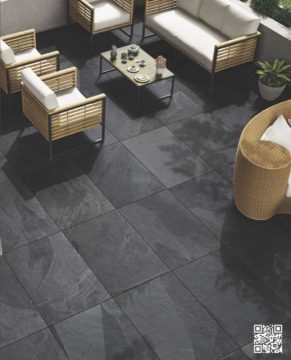
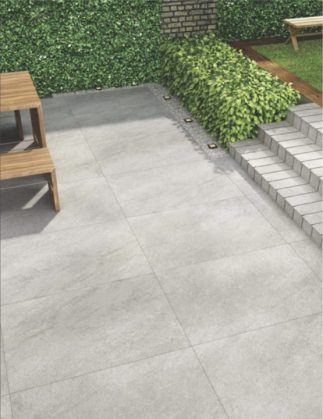
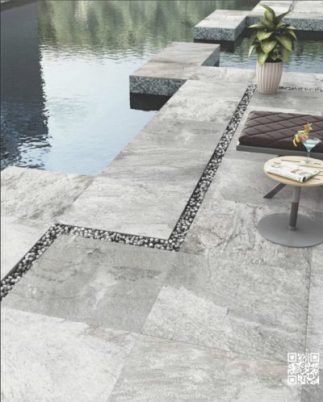
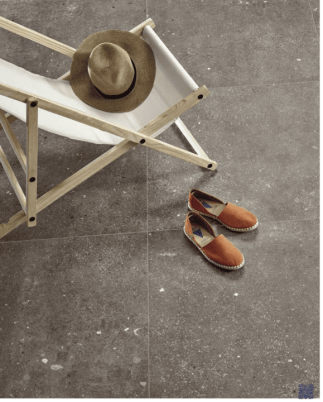
The importance of choosing a non-slip floor
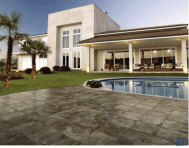
Pavements or flooring for the exterior of the house (garden, terrace, or pool) must meet certain requirements to ensure that you won’t encounter problems in the long run. Tiles placed on the exterior of our homes will be exposed to weather conditions, especially rainwater, frost, etc. Therefore, we must choose tiles that ensure durability without breaking outdoors, maintaining all their characteristics and features.
Another crucial aspect in exterior pavements to consider is water (usually from rain or pools). This makes it necessary to choose non-slip floors that provide safety, preventing falls and slips. To determine whether a tile is slippery or not, a classification is used:
Classification of non-slip floors
The Spanish regulation for non-slip ceramic floors classifies tiles into 3 levels:
NON-SLIP CLASS (1)
Pavements and tiles that meet this classification are suitable for placement in dry indoor areas, with a slope of less than 6% (100% of indoor areas in homes).
C1 has sufficient non-slip properties for use in indoor spaces. Its non-slip capacity is minimal but necessary for the location where the tile is placed.
NON-SLIP CLASS (2)
These non-slip tiles are ideal when seeking a secure floor inside our homes or in areas where there may be some moisture, such as bathrooms, kitchens, changing rooms.
C2 tiles and floors have intermediate non-slip properties and can also be used outdoors.
NON-SLIP CLASS (3)
This type of tile has the highest non-slip classification. They are ideal for outdoor spaces like the pool, gardens, and terraces, but also for interiors with abundant water contact and aggressive substances that may decrease non-slip capacity, such as parking lots and industrial areas. Although their touch and finish are somewhat rougher. Therefore, before purchasing this type for the interior, we must ensure that we like the texture, as it could be a drawback.
This nomenclature is easy to understand – the higher the C level, the greater the non-slip properties of the product. In other words, a C1 product is less non-slip than a C2 and C3 product.
Non-slip C3 pavement is commonly used for sanitary, commercial, and public spaces.
Characteristics of porcelain floors
These floors undergo a single firing process exceeding 2000°C and are characterized by very low water absorption, high resistance, and a guarantee of durability. They efficiently adapt to sudden temperature changes, exhibit great versatility, and require simple maintenance. Their inability to absorb water preserves them in extremely cold environments, making them the preferred choice for outdoor spaces, especially in regions and countries with cold climates.
Their increasing popularity is attributed not only to these characteristics but also to their ability to mimic other materials and their easy installation.
Glazed porcelain stoneware and cleaning
One of the virtues of this type of flooring is its straightforward cleaning process. It can be treated with various products such as bleach or ammonia without fear of damaging the material. Colors do not fade, and the ceramic maintains its properties and resistance without issues. Stains do not easily embed, and working with water poses no problems, as the drying process is quick and simple. In summary, the advantages are numerous.
Most common formats of this type of flooring
Porcelain floors are highly versatile, offering smooth and textured tiles in the market, as well as pavements that mimic natural materials such as marble or wood, with a wide range of prices.
They can be distinguished between rectified and non-rectified floors. The former have trimmed edges to achieve a straight edge, while rectified porcelain floors are more uniform, with precise dimensions.
Regarding sizes, rectangular or square formats are the most common. Small pieces, such as 10×10 cm, are used in wall coverings, while larger sizes are preferred for floors, such as 90×150 or 120×120, with a thickness of 8 to 12 millimeters. Also, tiles with a thickness of 20 mm are manufactured, ideal for terrace and garden floors or areas near the pool, providing a spectacular finish.
Although smaller or even larger sizes exist, such as tiles of 120×240 centimeters, which add a greater challenge to the installation process. Currently, pieces of up to 1600×3200 cm are produced, leading to the development of tools and installation techniques that were previously unthinkable.
Finally, it is worth noting the low maintenance level of porcelain floors, which only require cleaning with water and specific products applied in a small area of the pavement.
Puede aceptar las cookies haciendo clic en el botón «Acepto» o configurarlas o rechazar su uso haciendo clic en la Política de cookies Reed More Accept Cookie Adjustment
Privacy Summarize
| Cookie | Duration | Description |
|---|---|---|
| cookielawinfo-checbox-analytics | 11 months | This cookie is set by GDPR Cookie Consent plugin. The cookie is used to store the user consent for the cookies in the category "Analytics". |
| cookielawinfo-checbox-functional | 11 months | The cookie is set by GDPR cookie consent to record the user consent for the cookies in the category "Functional". |
| cookielawinfo-checbox-others | 11 months | This cookie is set by GDPR Cookie Consent plugin. The cookie is used to store the user consent for the cookies in the category "Other. |
| cookielawinfo-checkbox-necessary | 11 months | This cookie is set by GDPR Cookie Consent plugin. The cookies is used to store the user consent for the cookies in the category "Necessary". |
| cookielawinfo-checkbox-performance | 11 months | This cookie is set by GDPR Cookie Consent plugin. The cookie is used to store the user consent for the cookies in the category "Performance". |
| viewed_cookie_policy | 11 months | The cookie is set by the GDPR Cookie Consent plugin and is used to store whether or not user has consented to the use of cookies. It does not store any personal data. |
¿En qué podemos ayudarte?
